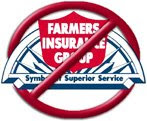Has Farmers Insurance lost its integrity and ethics in claims handling and treatment of employees?
A now-former Farmers insurance adjuster who became increasingly agitated over a company mandate to specify aftermarket parts and require discounted body shop pricing in his estimates – eventually taking allegations of wrongdoing to the state’s insurance department – has been denied whistleblower status by a California appeals court, which ruled that his dismissal was justified and he is now liable for Farmers’ legal expenses.
After losing a wrongful termination lawsuit at the trial court level, Beau Yeakel argued his contentions before a Second Appellant District panel.
Testimony in the case centered around a series of escalating verbal confrontations that Yeakel had with his supervisors, culminating in a sexually graphic telephone message left on a manager’s voice mail. Yeakel said he made the remark thinking that his attempted call had been disconnected. It had not been, and the offending language was recorded and shared up the chain of command.
Farmers’ executives testified that Yeakel had been repeatedly “counseled” about his behavior, yet objectionable incidents continued.
Working in Ventura and Santa Barbara counties, Yeakel’s supervisors were Gabe Snyder Barbara Mann.
According to case transcripts, Yeakel objected to Farmers’ practices that he said involved using alternative or aftermarket parts in the repairs where possible, to include a discounted price for the use of original equipment manufacturer parts, and to include a discounted labor rate that was less than the prevailing rate charged by the local repair shops.
Neither Yeakel nor his lawyer was available for comment. A phone listing for Yeakel rings into a fax machine; his lawyer did not respond to repeated messages.
At various times between 2003 and 2005, according to the court documents, Yeakel complained to Snyder and Mann that none of the shops in his assigned territory would agree to the parts and labor discounts sought by Farmers. Yeakel believed that the inclusion of such discounts in his estimates eroded his credibility with the repair shops and created additional work for him when he had to rewrite the estimates to eliminate the discounts.
In his complaints to his supervisors, Yeakel also expressed frustration that Farmers’ discount practices were adversely affecting his performance evaluations. As described by Yeakel, the discounts were considered in Farmers’ “key performance indicators,” which was a compilation of the criteria against which a claims representative’s performance was measured and upon which performance reviews and pay raises were based.
Yeakel had several heated discussions with Snyder about his performance reviews because Yeakel felt that he was being unfairly rated based on discounts that no repair shop would accept. Yeakel also voiced his opinion that aftermarket parts did not fit properly in the repaired vehicles and that Farmers’ parts discount was “unethical.”
In response to Yeakel’s complaints, Snyder advised him that these were the company’s orders and that Yeakel was required to comply with them.
In late 2004 or early 2005, Yeakel also complained to Rosanna Ortiz, Farmers’ human resources operations specialist, about the parts and labor discounts as they related to his performance ratings. Among other issues, Yeakel indicated that the parts discount was making his workload insurmountable. In response, Ortiz told Yeakel that Farmers reserved the right to do business in any way it decided.
Yeakel raised additional concerns about Farmers’ business practices when he was counseled by his supervisors for various performance and behavioral issues, according to the court’s documentation.
For example, in July of 2004 Snyder issued a written warning to Yeakel for his poor performance in failing to timely process claims and his inappropriate behavior during a discussion with Snyder about performance concerns. Upon receiving the written warning, Yeakel remarked to Snyder that Farmers had “lost its integrity and ethics in claims handling and treatment of employees.”
In January of 2005, Mann held a unit meeting in the Ventura office during which she asked employees in attendance to provide referrals for an open position at Farmers. Yeakel replied that he would not refer anyone to the company because he had too much integrity and did not feel the workload was manageable.
Mann later met privately with Yeakel and counseled him that his comment at the meeting was not appropriate. Yeakel in turn voiced his frustration with Farmers, telling Mann “when you start affecting people’s performance reviews because they can’t get parts discounts in an area where they can’t get discounts offered, how can you improve on that?”
In addition to his internal complaints to management, Yeakel also contacted the Department of Insurance about Farmers’ business practices. Specifically, in 2001, Yeakel called the Department of Insurance to inquire about the process involved in investigating Farmers’ parts and labor discounts. During that call, Yeakel communicated his belief that Farmers was using an improper parts discount and a labor rate that was less than the prevailing rate.
However, Yeakel decided not to file a formal complaint with the agency because an agency representative advised him that his complaint could not be kept anonymous. Yeakel never told anyone at Farmers that he had contacted the Department of Insurance, and he has no knowledge that anyone at Farmers was aware of his call, according to testimony in the case.
Things came to head in February of 2005, when Yeakel left the ill-fated accidental voice mail message after attempting to reach Snyder three times. ABRN will not publish the content of the voice mail; suffice to say it was rude and crude.
When Snyder retrieved his messages, he heard Yeakel’s recorded insult. Snyder then shared the recording with Mann, who was offended by Yeakel’s words and believed them to have a sexual meaning.
A few days later, Mann met privately with Yeakel and played the voice mail message for him. Yeakel was shocked to discover that his statement had been recorded. He admitted to Mann that he inadvertently had left the message on Snyder’s voice mail system and apologized for doing so. He also offered to resign rather than have the matter written up in his file.
Mann, however, told Yeakel that resignation was not necessary. She indicated that she would have to report the matter to Farmers, but said to Yeakel, “‘give me some time, and I’ll see what we can do about it.’” Yeakel later apologized to Snyder for his actions in leaving the message. Snyder assured him that he was not offended.
Due to the nature of the voice mail message, Mann referred the matter to Farmers’ human resources department. Mann also directed Snyder to prepare a memo documenting Yeakel’s various performance and behavioral problems since 2004.
The subsequent memo from Snyder in March of 2005 included a reference to the written warning issued to Yeakel in July of 2004, and to Yeakel’s oral statement in response to that warning that the company had “lost its integrity and ethics in claims handling and treatment of employees.”
After reviewing a draft of Snyder’s memo, Mann approved it for distribution to the human resources department, where it was determined that the message had a sexual meaning in violation of the company’s harassment policy and code of business ethics.
The wheels of dismissal were thus set in motion.
In March of 2006, Yeakel filed the wrongful termination lawsuit. In an amended complaint, Yeakel alleged that Farmers had policies that prohibited him from disclosing perceived unlawful conduct by the company to government agencies. He also alleged that Farmers wrongfully terminated his employment in retaliation for his refusal to participate in Farmers’ estimating practices because he reasonably believed that such practices violated state law.
The trail court judge granted a summary judgment in favor of Farmers and against Yeakel, who appealed the ruling.
The appellate panel denied his claims. “We conclude that the trial court properly granted summary judgment because Yeakel could not identify any policy of Farmers that prohibited disclosures of perceived unlawful activity to government agencies, nor could Yeakel demonstrate that he had a reasonable belief that Farmers’ business practices were unlawful.”
Source abrn.search-autoparts.com
Labels: adjuster, auto insurance, bad faith, farmers group, farmers insurance, farmers insurance group, lawsuit


